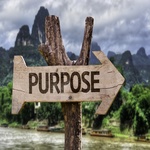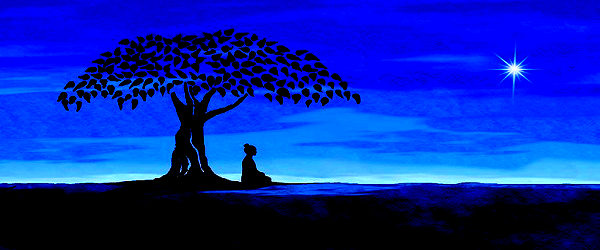I want to talk about a few things. The first is about what it takes to practice meditation and mindfulness.
I talk to a lot of people who are of the opinion that meditation is something separate from their daily life and that the meditation is a particular time when they do a particular thing, a particular activity such as sitting or something like that. For many people a walking meditation is a stretch, they say: “Okay, I’m supposed to meditate but I’m also supposed to walk, so how does that work? How do I fit those things together?”
The reality is that meditation is designed to familiarize you with a certain state of mind and to make that sate of mind accessible to you at all times, because you’re becoming familiar with a sort of a static piece of it during the time that you sit or walk or whatever it is that you’re doing. It’s not intended, however, to be separate from your normal daily life.
In other words, a lot of people might say: “Well, don’t meditate when you’re driving,” but if you’re practicing mindfulness meditation, that is exactly what you’d want to do. You want to be mindful when you’re driving. You want to be mindful when you’re walking. You want to be mindful when you’re kissing your lover or your spouse. You want to be mindful when you’re making love. You want to be mindful when you’re cooking or taking out the trash.
Every opportunity is an opportunity to be mindful.
We’re talking about deepening the experience of being human, the experience of being alive. Meditation is about deepening the experience through focusing and through keeping an open mind.
The basic ground for meditation is the spaciousness, the emptiness, and that realization of the true nature of observation and of experience.
Now, we live in the experience, but we are not necessarily limited to the experience, although experience after experience is how we learn to open up, to grow, and to do the things that we need to do.
From a very early age, my initial introductions to meditation came in a variety of forms. I began researching life and death, spirituality, consciousness, what it means to be alive, and what existence is at a very young age on my own, at about age seven.
When I was age six, at just about this time of year, my brother committed suicide in our back yard.
I came from a fairly violent family, in that my parents drank a lot and were violent with each other. I can’t just say that my dad beat my mom and that’s the way it was, because it was like that, but my mom was a participant also. The two of them seemed to jump on it quite regularly and my siblings were much older than I: the closest one being 8 years older, my brother, the one who died, was 12 years older than me at the time I was born, my sister was 14 years older than me, and of course I have a couple of half brothers from my dad’s first marriage who are even older than that. I was very much the baby of the family and very much the younger one. When my brother died, I knew at that time that I had serious questions about life and death and that the adults in my life were not able to address those questions. They weren’t able to provide any answers or really any guidance.
Very, very Christian, they were all Church goers. If you knew my grandmother, Esther Jensen, you’d know that she was a very devout woman. She raised her kids to be spiritual, to be Christian, and eventually she became Mormon. I think, regardless of what you think about Mormonism, they do have a very strong family orientation and I think that this extended her life and her usefulness as a person and her ability to provide for others and to do things for others. She was 80 years old and taking care of ladies in their 60s who were in need of help through the church. She was very active and that was just who she was, who she is, and who she will always be in my mind.
I like to tell this story about her, just this bit of history, when her house was burglarized.
She was home, taking a nap, I think (she was very old, she was probably in her 70s or in her 80s), when she was woken by some sounds in the living room of her house, and she got up and found someone going through her drawers and looking for her valuables. Now, she wasn’t a woman of means really, and whatever she had, if she had any silver or the like, it would have been only a piece or two and yet here’s this gentleman going through her stuff.
She comes out and sees him doing that and says: “What are you doing?” Well, obviously he was caught and he says “I’m looking for something…” and she says: “Does your mother know you’re here? Does your mother know what you’re doing?” and then she made him a sandwich!
He didn’t get what he came for. Well, he probably took some things, but she said: “You poor man, if you’re so desperate, let me feed you. Let me give you sustenance because you must be very desperate.” So that’s the way my grandmother was. She believed, and she had that depth of faith, that depth of trust to give herself personal strength. She would get so excited that she would shake just when talking about things. Particularly if she was speaking about her faith, she would just get so excited. I’ve seen animals, mostly dogs, do this kind of thing but not very many humans.
She was very small, she was 5’2, I think, at her height, at her tallest, and then that began to shrink as she got older. She used to be this very small, pretty thin woman who would just get so excited that she would shake when she would talk and I can’t imagine what that poor man must have been going through when he encountered her, because she was not like everybody and she wasn’t afraid of him.
She wasn’t afraid of anything in fact. I don’t know what that would have been like, but I do know that there’s a famous story of the Zen master who catches someone burglarizing his house and he does the same thing. Basically, he feeds them and then loads them up with food to take with them and that sort of thing.
When the man leaves he is standing at the window looking out at the moon and the stars and he thinks: “If only I could have given him this experience of looking at the moon and the stars…”
The experience of looking at the moon and the stars, having just been robbed and yet feeling whole and secure and safe, I think that kind of experience is the kind of experience people want. They want to feel that secure and that safe that no matter what happens, they don’t panic or run off into fear or get depressed or whatever people do when encountered with unpleasantries in life.
So this is the meditation. This could very well be the goal of meditation: to stabilize the experience, the sense of presence, that sense of trust, and that confidence that one has to simply exist in the world.
This doesn’t need to be reserved for a special cushion or a particular point on the wall or a statue or anything. This is simply a way of existing in the world and meditation is a way to access the non-self experience. When we’re encountering the world, when we’re making decisions, when we’re making judgments, and when we’re doing things and all of this, do we lose touch with that aspect of ourselves which is spacious and interconnected with all beings or do we keep that in the forefront whilst we experience the individual needs, wants, and protective aspects to maintain the individual life?
We don’t have to maintain the individual life separate from the greater life, separate from the seat of awareness which is the universal consciousness.
This is the goal of meditation: to allow an individual to exist in the state of awareness that comes through the spacious nature of being, at the same time function in the world in a way that allows for growth and for potential of the individual as well as the community.
These aspects are often thought to be diametrically opposed. So much of existence in the world is about the self and fulfilling the self’s interests. When we existed as a primitive species, that was critical for the survival of the species. If the individuals were not focused on survival of the self, the species could not have survived.
So there’s a long history of needing to have this self-centered focus and we continue to see it exist. Beyond the self and to the next level, of course, is the group. We have a lot of tribalistic influences even still. There are many people who are choosing to be part of a tribe. We have a candidate for president right now, Donald Trump, who is focused on that tribal aspect of the base of the Republican Party. From that arise the tendencies for racism, species-ism, and sexism and all those things.
Powerful individuals who love tradition, the power that they get through the traditions, seek to eliminate all influences that would distract from those traditions and so we hear a lot of things about “keeping Mexicans out, keeping Muslims out, and creating special zones for Muslims” and all kinds of things like this. This is all because the need to survive in a primitive culture and society is enhanced through minimizing outside influences. You can’t develop a culture if that culture continues to be overrun with outside influences all the time.
This is the reason for the meditation, so that we can keep our balance, even when faced with the tribalistic nature of that part of our minds, that part of our being that feels the need to protect.
Thank you!
I always want to emphasize the nature of our connection to nature. We are controlling what’s happening on the planet. As it warms, as it’s’ resources are extracted and utilized and other things like this, let us take this particular opportunity, this particular moment, to focus on the planet in the way we would like to see it.
The only real failure in life is not to be true to the best one knows. -Buddha







